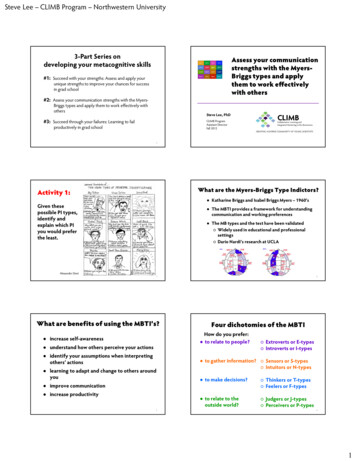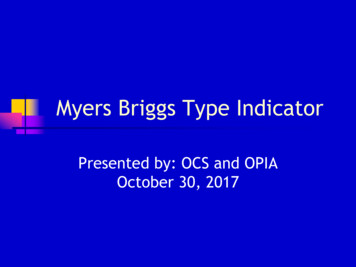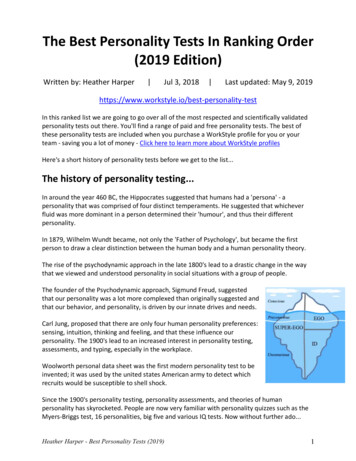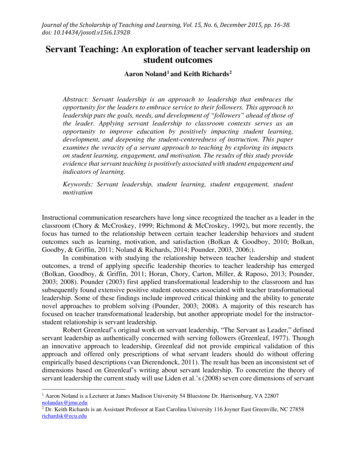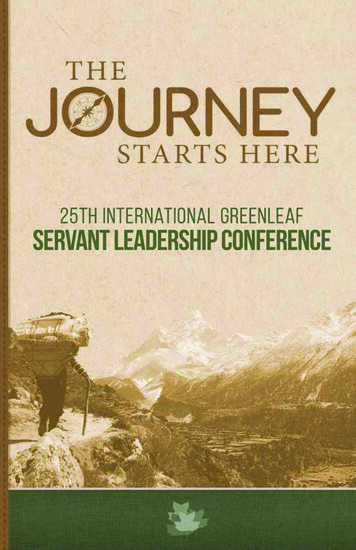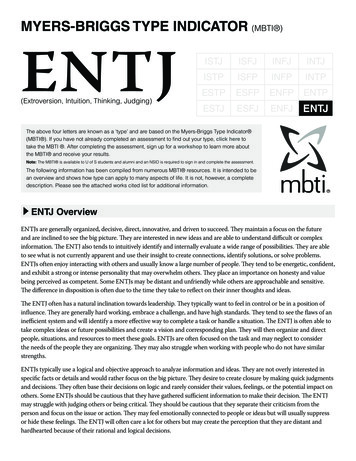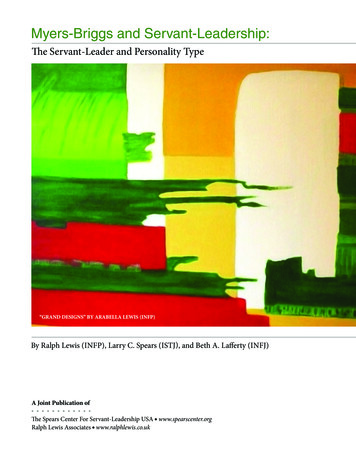
Transcription
Myers-Briggs and Servant-Leadership:The Servant-Leader and Personality Type“GRAND DESIGNS” BY ARABELLA LEWIS (INFP)By Ralph Lewis (INFP), Larry C. Spears (ISTJ), and Beth A. Lafferty (INFJ)A Joint Publication ofThe Spears Center For Servant-Leadership USA www.spearscenter.orgRalph Lewis Associates www.ralphlewis.co.uk
Myers-Briggs And Servant-LeadershipPage 2By Ralph Lewis, Larry C. Spears, and Beth A. LaffertyTable of Contents1. Myers-Briggs & Servant-Leadership:The Servant-Leader and Personality Type.3Ralph Lewis (INFP) and Larry C. Spears (ISTJ)Copyright 2008 by Larry C. Spears and Ralph Lewis2. Servant-Leader Characteristics, Personality Type,and The Hierarchy of Functions.17Beth A. Lafferty (INFJ), Ralph Lewis (INFP), and Larry C. Spears (ISTJ)Copyright 2010 by Larry C. Spears, Ralph Lewis, and Beth Lafferty3. Myers-Briggs Type Servant-Leaders and How They Serve.32Ralph Lewis (INFP), Beth Lafferty (INFJ),and Larry C. Spears (ISTJ)Copyright 2010 by Larry C. Spears, Ralph Lewis, and Beth LaffertyBrochure design by hEDWERXdESIGN www.hedwerxdesign.com
Myers-Briggs And Servant-LeadershipPage 3By Ralph Lewis, Larry C. Spears, and Beth A. Lafferty1Myers-Briggs and Servant-Leadership:The Servant-Leader and Personality TypeEditor’s Note: This publication is drawn from aseries of conversations between Ralph Lewis andLarry C. Spears over a period of several years.The central focus is on the intersecting pointsbetween Myers-Briggs and servant-leadership—two separate concepts that, the authorsbelieve, when taken together, can serve to furthertheir mutual development.Larry C. Spears: You and I have had severallengthy conversations over the years regardingservant-leadership and Myers-Briggs. Givenyour knowledge and experience as an MBTI(Myers-Briggs Type Indicator) trainer, whydon’t we begin with a quick review of theorigins of what is now generally referred toas Myers-Briggs, and which grew out of CarlJung’s writings.Ralph Lewis: The most important place tostart on the Myers-Briggs side is with CarlJung, and then to place upon that the typologythat Isabelle and her mother Katherine MyersBriggs developed. For me, Jung gives a verysimple, coherent framework that is actuallyabout human development. Jung was notinterested so much in the classification ofpeople as he is in the creation of a “compass,”a map, to look at the journey that we all havethroughout life. For Jung, typology was astarting point—a basic orientation for howwe deal with the world. At the core of allof it is the recognition that each person haspreferences in viewing the world. It is not somuch a given as a starting point to say this isyour personal preference for how you deal withall the issues and complexities of the world—how you choose to make meaning of the world.But, I think a very important point to stresshere, Larry, is that it’s a journey, and once weunderstand the beginnings of where thesepreferences are, Jung is quite clear that whetherwe like it or not, we need to develop a dynamicwithin ourselves. In fact, Jung saw this as asource of much creativity.Katherine and Isabelle Myers then translatedJung’s work into what is called the MyersBriggs Type Inventory (MBTI), which theystarted in the 1920s in Florida. Their premisewas very much in line with Jung, and withRobert Greenleaf, which was to help peopleto understand their own unique gifts. In fact,Isabelle’s last work on Briggs typology wascalled Gifts Differing, which was based on aquotation from St. Paul. She really wantedto emphasize that we all have gifts that webring into the world, and for her, the mostimportant aspect of the typology was in helpingus recognize those gifts in ourselves, but also,recognizing those gifts in other people. Thatis why I think that Isabelle was a true servantleader. This was not something that she wasdoing to classify people; rather, she soughtto help people to understand better boththemselves and others. She sought to serveothers in this way.MYERS-BRIGGS AND LEADERSHIPLarry: Robert K. Greenleaf ’s efforts to serveothers are probably best known through hiswritings on servant-leadership in a numberof essays and books in which he sought todevelop and share his thinking with otherson the meaning of “the servant as leader.”However, before we talk about servantleadership, I would like to ask you if you couldshare your thoughts about the Myers-Briggstypologies as the construct relates to the fieldof leadership broadly. How have you come to
Myers-Briggs And Servant-LeadershipPage 4By Ralph Lewis, Larry C. Spears, and Beth A. Laffertyview its potential benefit and usefulness forleaders, and in the area of leadership education?been working diligently, but in a very differentway, and I failed.Ralph: Everyone leads in a different way.There are certain things we have to do asleaders: paint a picture, create a vision, wadeforward, and communicate that to people.However, we may do it in very different ways.Not only do we do it in different ways, but alsowe can have different objectives for doing it. Ifwe want people to develop as leaders, we needto recognize that what is right for one personcould be horrendous for another person. Theysimply could not lead in that way. One of thekey issues that we find in most organizationsis that there is an enormous tendency forleaders to try to develop other people in a cloneimage. We try to create other leaders in ourown image, and for me, the most importantidentifier of a good leader is whether they allowothers to do things differently.Larry: I have seen the same thing occur inthe non-profit field over the years, betweennon-profit boards and their chief executives.While I favor small boards over large boards,one of the particular challenges of a small boardthat can arise is if it is made up predominantlyof a particular Myers-Briggs type and a chiefexecutive from an opposing type. I haveobserved this occurrence in several organizationsover the years, and I have experienced it directly,myself. It can be very difficult.I did some work for a small organization, andthe managing director was from a financialbackground. Very concrete and down-to-earth.Very keen on detail, on budget, on order. Goodstuff, because you need that in organizations.However, he hired a marketing director thatI never got to meet because he fired him afterjust three weeks. I said, “Why did you get ridof him?” He said, “Well, he wasn’t doing hisjob. He was a terrible marketing director.” Isaid, “What happened?” He said, “Well, youknow what he was doing? He was out takingcustomers to lunch every day. He wasn’t inhis office working.” I laughed, I’m afraid, andI said, “But if I had just joined the company asa marketing director, I would want to knowwhat the customers thought of us.” “That’snot proper work,” he said. I tried to get himto understand that the marketing director hadRalph: Absolutely. In fact, that is a very goodexample because a lot of work has been doneon teams. Now, a board isn’t quite a team,but it is a group of people who have a sharedcommitment to something. One of the findingsis that the very best teams are ones that havethe range of types of people with differentpreferences in them. To take your example, ifyou have a chief executive of one type and aboard of other types, in practice that could beextremely good, providing they all understandand respect the different points of view. If theyare going to succeed, they will succeed muchbetter than anyone else will, but, and there isa big “but” here, there is always potential fordisaster because of conflict. The other situationis where you have a CEO who has a boardhaving the same Myers-Briggs type and thereis no opposition, no discussion; then they areliable to agree very easily and without muchdebate. On the face of it, you would thinkthat is a good thing. However, there is a realpotential for terrible things to happen whenthere isn’t any conflict.
Myers-Briggs And Servant-LeadershipPage 5By Ralph Lewis, Larry C. Spears, and Beth A. LaffertyA very good example of that from U.S. historyis the Bay of Pigs invasion. President JohnF. Kennedy made the decision to invade theBay of Pigs in Cuba and everyone said, “Yes,Mr. President.” Such a disaster. Afterward heasked, “Why didn’t you challenge me?” andthey said, “You are the president. We thoughtit was a stupid idea, but we didn’t say so.”Kennedy, to his credit, said: “Every time I bringforth an issue, I want someone in this groupto tell me all the reasons why it will not work.”Healthy differences can actually generate thebest solutions.PREFERENCE AND BALANCELarry: There seems to be some difference ofopinion within the Myers-Briggs literatureregarding personal preferences and desirablebalance. Some suggest that our preferencesare also usually our strengths, and that ratherthan attempting to develop some internalbalance (say between our Sensing and Intuitiveelements); we really should lead with ourstrengths and not attempt to develop ourinferior, secondary functions. Others suggestthat there is an unconscious aspect withinmost of us that will ultimately seek to assertitself later in life in an effort to create a morebalanced and whole person. What say you?Ralph: Whatever your preference, Jung wouldsay, “If you’re going to be very good in thisone area, you’re not going to be good in thisopposing area.” However, balance is a lifelongtask. We may or may not get there. The key isrecognizing this and making certain that youhave someone else in your team, or workingwith you who complements you, and the mostimportant point is to listen to that person. Ihave worked with many managers who are verytask focused and who have very few peopleskills, but the common ending is to achieve thebottom line. The good ones recognize this anddon’t try to become the world’s best coach, butthey make certain that they are complemental.Often their personal assistant serves as theircomplementary partner.I can remember one leader who had his p.a. inhis office before we went in, and when we wentin--she would always ask you in ten minutesearly, and would say, “Well, he’s been telling mehow much he appreciates you and the work youdid the other day. He thinks that presentationyou gave the other day did this,” or “He’s a bitconcerned about that,” and people would leaveher feeling wonderful, and then he would say,“Well, this needs to happen by this, and thisneeds to happen by that,” and you’d say, “Yes,that’s fine,” and you’d walk out and she’d say,“There you go! You know it’s only because hetrusts you to do the job.” I don’t know if it wasdeliberate, but it was very clever and effective.Larry: I believe that both Jung’s work andMyers-Briggs are to some degree about theimplicit search for wholeness. Likewise, RobertGreenleaf ’s writings on servant-leadership havea similar goal in mind. To what degree is itpossible or desirable for each of us to becomemore balanced? Alternatively, is our typepreference pretty much set within each of us?Ralph: Well, I feel very strongly that inorganizations it is much better to have peoplewho balance you because that is better ina practical, everyday sense. In addition, ifyou have those people and you are open tothem, you can develop more yourself. Youwill actually learn from them. So, on apractical everyday level, have people who are
Myers-Briggs And Servant-LeadershipPage 6By Ralph Lewis, Larry C. Spears, and Beth A. Laffertycomplementary, with whom you enjoy workingand whose abilities and differences you respect.Jung was a mystic, and he talked about the selfwith a large S, “Self,” and the “ego.” The ego forJung was the provisional construct. Ego is theway that we use to order the world. The Self,the conscious and the unconscious, contains allthe characteristics, all the typologies. It’s justthat we have an unconscious tendency to viewthe world in a certain way. Let’s say you havebeen brought up as a scientist. You can thinkanalytically quite well, but you may be terribleat writing poetry or counseling people. It isn’tthat you can’t write poetry; it’s just that it isn’tyour natural tendency. Jung was clear thatthe journey through life is a journey throughwholeness, but there are different stages.He would say that up to midlife, ourresponsibility is to help one another by goingwith our preferences. It is to make the most ofour natural tendencies. Therefore, if you havea natural tendency toward analytical thinking,you should use it, rather than attempting towrite poetry. That is how you can best serveothers. When you have succeeded in the world(and your definition of success will dependon your typology), then midlife kicks in.Moreover, it’s not a matter of chronological age.Some get there earlier, some later. Some neverget there. It could be at age 30, 45, 60, etc. thatthe natural tendency of the psyche to want tobalance itself out will occur. Whether we likeit or not, Jung says, the unconscious will haveits way. I liken it to holding a helium-filledballoon underwater. The natural tendency ofa helium-filled balloon is to float upwards, butyou have pushed it underwater, and you keeppushing and pushing, attempting to hold itdown. Eventually, of course, what is going tohappen is that your hands are going to slip andthe balloon is going to burst out of the water.The harder you push down, the more forcefullyit is going to come up in your face, and Jungstates that that has happened to all of us.Let’s say that you are an extreme judgingtype--someone who likes everything planned,ordered, settled. Jung would say, “But youhave in you, on the unconscious side, an equalcapacity to be playful, spontaneous, and to justgo with the flow. That is your balloon underthe water. Now, don’t worry about this untilmidlife when you have used your judging toplan, organize, and get where you want to be.Then you can start letting your spontaneity andplayfulness rise gently to the surface. There’sno more need to hold it down as strongly asbefore.” There is a very interesting book on theshadow side of personality types by MurrayStein. He talks about how, in midlife forexample, the more intuitive people, thinkingpeople who tend to deal in ideas and concepts,suddenly develop an interest in tennis or othersports that are more practical and down-toearth. It’s as if a person says, “I’ve achieved this,so now I’ll take more of an interest in other areas.”Now, if you, as a strong judging type, are fearfulof losing control and you push even harder tokeep that balloon of spontaneity underwater,then Jung would say, “Fine, but the balloonis going to come up and hit you sometime.”Jung is saying that which we did not bringto awareness will manifest itself in our liveswhether we like it or not. Jungians are verykeen on this. I know a man who was workingin a job that he did not enjoy. He wanted tobe a Jungian analyst, but it was impossible,economically. He had three car accidents inthe space of a year; the third time he hit the tireof a bus carrying some senior citizens, and for
Myers-Briggs And Servant-LeadershipPage 7By Ralph Lewis, Larry C. Spears, and Beth A. Laffertyhim, these were very strong messages from hisunconsciousness saying, “Your life is not on theright track. You’re going to keep running intoobstacles until you get yourself settled down.”Maybe slightly farfetched, but if you are goingto work, feeling miserable and unhappy, Jungwould say, “Look at yourself. You are not usingyour talents,” and Isabelle Myers would say,“You are not directing your talents in the waythey should go.” It’s like a river flowing to thesea. Your talents are being blocked; you need tofind the right riverbed for them.Larry: Is it a matter of not using your talents,or is that you have not developed youropposing gifts?Ralph: It can be either, you see. That’sthe complication. This is why anyone whodoes the Myers-Briggs work needs to spendsome time in deep reflection, because we areborn with preferences. If I’m brought up inan environment that blocks the use of mypreference, I may actually, in an ironic way,develop the opposite first, but life will be hard.Life will be exhausting, because it is as if I amalways trying to wade upstream.Let me give you a very quick example.Someone I knew from the city of Glasgowwas brought up in a poor area. There were nobooks in the house. If she ever read, which sheenjoyed doing, she was laughed at. So she gota job in a retail organization, and because shewas highly intelligent, eventually she movedto being a personnel manager. When she didthe Myers-Briggs at the age of about 25, shecame out as a very strong people person MyersBriggs type. I didn’t believe this because shedidn’t have fun using her people skills. Therewas no spontaneity. There was no joy. Shetalked about what she should do with people,but it was just going through the motions.Eventually her job was eliminated and shedecided to go back, and I think she decided togo to college. She was accepted for her Master’sdegree, and she loved it! It was as if she wascoming to life for the first time. She did theMyers-Briggs with me a year later and she cameout as an intuitive-thinking type, which is thetheoretical, conceptual, slightly academic type,and I personally believe that she had found hertrue calling. Now she is a lecturer at a businessschool, and she says, “You know, they pay meto do this!”, as if she couldn’t believe it. Mostpeople, if they have reasonable breaks in life,will develop their talents. Unless they blindlyfollow their parents! You know, you hear ofthe accountant who says on his deathbed, “Iwish I had played the piano, or had been in arock band,” for example. However, most peopledo seem to get more or less good use of theirtalents. It is those people who Jung would sayin midlife need to develop their opposites.Larry: Let’s take the balloon analogy a bitfurther. What are your thoughts about howthat fits into the four sets of types? Are welikely to be hit in the face, or to naturallybalance out those extreme divisions within ourown personality? In addition, if you are notconsciously trying to do that, is the balloon morelikely to hit you in the face in different ways?Ralph: Very good questions! It is a slightheresy to orthodox Myers-Briggs thinking andto a degree the Jungian theory, but I do thinkthat we can develop. If you get people who arein the middle between thinking and feeling,the perceived wisdom is either that they areimmature in the sense either that they have notdeveloped fully or that they are mature and
Myers-Briggs And Servant-LeadershipPage 8By Ralph Lewis, Larry C. Spears, and Beth A. Laffertythey have developed both thinking and feeling,but they don’t have a particular preference. Myrule of thumb normally is that if you have ayoung person, say 18 or 25, and the test resultsbetween thinking and feeling come out equally,I would be slightly suspicious. I would say thatthey haven’t been faced with enough of life’schallenges to know which road they would godown. But when I meet people with experiencethat are 40, 50, 60, then I do find that theyoften have allowed themselves to developthe other side. The key is the expression“allowed themselves,” because I don’t think youconsciously need to say, “Today I will developmy other side,” but there will be indicationsthrough the years, and you have to listen toyourself and to other people.If you are a very strong thinking type, analyticaltype, and someone comes into work and theyare in tears, developing your people side, yourfeeling side, is not going to take an awful lot.It is just going to take the courage to be ableto sit down with that person and say, “Tell me.What’s the problem?” and just listen to them.Nevertheless, I have known leaders whom Irespect who haven’t been ready and have beenterrified of situations like that. I can reverse itthe other way equally. You have people whoare very, very empathetic, very caring, whofind it very difficult to have the courage to sayto someone, “Your performance isn’t up toscratch,” which is equally necessary. I thinkthat you have to look beyond the Myers-Briggsscore and ask yourself, “Are you sure you’vedeveloped these areas?” and get some feedbackfrom other people. I do think you can developthose weaker or less comfortable preferences.If you have an extremely strong preference forone way, it may be more difficult for you tolisten to opposites, and the message of yourdiscomfort will be stronger. As long as youlisten to it, the balloon will not hit you in theface. If you are repeatedly uncomfortableand you refuse to acknowledge it, then thatballoon is going to pop right up and hit you.A friend of mine said it is like the differencebetween being at home and visiting. Weusually prefer home. When we are at home,we kick our shoes off and we relax. We knowthose preferences and we just enjoy them.However, when we go out and visit, we behavea bit differently. We visit other people or otherplaces to get experience. We go out and we trydifferent things. We try using other functionsthat are quite different from our naturalpreferences. It is quite tiring, so we comehome and we rest and then we go out again,and gradually, we are expanding our home, orour self, if you may. That concept of visiting,I think, is a lovely concept. “Let me try this. Imay not be very good at it, but let me just try todo it in a different way today.”SERVANT-LEADERSHIPAND MYERS-BRIGGSLarry: Let’s talk about Myers-Briggs in relationto servant-leadership. To begin, how usefulis Myers-Briggs in relation to the themes ofleadership and service?Ralph: The first thing I would say is that at thebasis of Katherine and Isabelle’s work was theidea of service, although it is not spelled out.Different types have different gifts to offer inservice, but that is not explicit in their writings.There has been an enormous amount of workdone in applying typology to styles of prayerand in communicating with God, and various
Myers-Briggs And Servant-LeadershipPage 9By Ralph Lewis, Larry C. Spears, and Beth A. Laffertyother religious aspects that may focus on anelement of service, but it certainly would notbe in the business context. I think the conceptof service and typology is critical. There is atendency to downplay the rational, artistic,and guardian aspects of types in service. Butthose other aspects are equally important. Forexample, a timely bus driver or train conductor,a smiling waiter in a restaurant, the chef whohas prepared a delicious meal, musicians inan orchestra, a shopkeeper or a bank teller,a plumber and an electrician—each of thesepeople provides an incredibly important serviceto others. Absolutely vital.Service comes in all shapes and sizes. You canhave practical service, social service, theoreticalservice, and idealistic service. I think thatmany people who read Greenleaf are biasedin Myers-Briggs types toward the idealist.Therefore, their concept of servant-leadershipwill also be idealistic—saving the planet,saving humankind, etc. All of these are equallyimportant, and I think that any discussion ontype and service really needs to emphasize thatevery single person, whatever their typology,has the potential to be a fantastic servant-leaderaccording to their gifts.Larry: That takes me precisely to the mainpoint of my interest: What possibilities arethere for further development around MyersBriggs and servant-leadership? I am focusedat the moment on how Myers-Briggstypologies can be an aid to servant-leaders ofall types, and I’m also wondering if thereways in which servant-leadership mightsomehow inform, or add to the knowledgebase of the utility of the Myers-Briggs typeindicator. What do you see as the potentialbenefit and uses of MBTI, or even Jungianthought, in the ongoing development ofservant-leaders and servant-leadership?Ralph: I absolutely think that the Myers-Briggscontributes an enormous amount. I think thatto direct the Myers-Briggs in terms of servantleadership and how you use your gifts to fulfillRobert Greenleaf ’s Best Test is critical. Askyourself, “What does this mean to you, andhow can you help make certain that this isfulfilled?” The sensing-thinking type is aboutfacts and analysis. They tend to be the verydown-to-earth practical people, and they tendto like structure. For them, you see, structureis a service. Their servant-leadership is to setup structures, rules, and regulations. Structureis a gift because it enables other people to betreated fairly because the same rules apply toeveryone. You know what the rules are, youhave clarity, and you can be efficient in the wayyou go about doing things. Therefore, if youare efficient, that means that you have moretime for yourself. You have a better work/life balance, for example, because the sensingthinking types are the ones who come up withschedules, limits, and deadlines. Their servantleadership is demonstrated in using their giftsof organization and practicality to enable othersto get a job done efficiently and well. Of course,society is better off for it. Servant-leadershipgives each type a positive way to apply the giftseach one has to offer.Larry: Could you give a corollary thought andan example then to the intuitive-feeling?Ralph: Yes, and that is my own preference.Intuitive-feeling types, the idealistic types,at the extreme, and I am talking about theextreme, they regard structure as wrong.Everyone should be free to do what he or shewants to do. That is a little bit of an extreme
Myers-Briggs And Servant-LeadershipPage 10By Ralph Lewis, Larry C. Spears, and Beth A. Laffertypoint of view, but “Why do organizationsexist?” I think it can lead to people sometimesdisappearing in a cloud of idealism that has norelationship to the practical world. So, wherewould I see servant-leadership contributing? Ithink servant-leadership reminds those people,as it has reminded me, that we are united. Weare a family in a broader sense of the wordand that I can’t just “do my own thing” as anaging hippie. I have to direct those talents ofmind in connecting with other people. It isthat connection with other people that is thegift that I think servant-leadership brings tothe intuitive-feeling type. So, I need to usethat intuitive-feeling in helping the sensingthinking person develop fun and spontaneity,but also recognizing that the sensing-thinkingtype has given me a sense of structure, whichsurprisingly enough actually I really do need incertain situations.Larry: What is your Myers-Briggs type?Ralph: I am arry: And I believe you know mine is : Indeed.Larry: What about Sensing-Feeling types?Ralph: Sensing-feeling types tend to beslightly impatient with theory, or they tend tobe the great-connectors, and those who appearto care most about others. The challengeof sensing-feeling types is that they can usethose gifts for their own purposes. They arehighly charming, and that can lead to a lot ofmanipulation. Again, in servant-leadershipterms, when you get sensing-feeling types whoare true servant-leaders, they just connect withpeople. They care about people and they willdo just about anything to help people on apractical, everyday basis, and it is wonderful. Ilike to think of it as love in action, in servantleadership, in all types of love in action, but thisis an obvious one. It is the arm aroundthe shoulder.Larry: And Intuitive-Thinking types?Ralph: Intuitive-thinking types are theopposite. They tend to be theoretical. So theywould tend to be a bit more uncomfortable indealing with people on a day-to-day level withwarmth. Intuitive-thinking types tend to lovedealing with ideas and concepts. The negativeside can be that you may get into argumentsabout how many angels fit on the head of a pin.On the other hand, I am with John Deweywho said, “There is nothing as practical as agood idea.”I think the great gift that intuitive-thinkingtypes bring to servant-leadership is the ideato provide concepts, visions, and directions,to excite people with just a new idea that cantransform their lives. Let me give you oneexample. In the United Kingdom where Ilive, local politics used to be about providingservices. One of Mrs. Thatcher’s ministersreframed it, looked at it from a different way,and said, “It’s about the role of local politicians,local authorities. It should be about enablingpeople to have the services that they need.”Now, leaving aside the political things, that’san enormous shift, and what he was basicallysaying is, “Let’s help people to develop theirown capacity, their own services,” which in mymind is servant-leadership, but going about itin a different way. This is about respect anddignity, enabling you to provide for yourself
Myers-Briggs And Servant-LeadershipPage 11By Ralph Lewis, Larry C. Spears, and Beth A. Laffertywhat you need rather than having someone tellyou what you need and giving it to you as if youwere incapable.Larry: Let’s talk about the introvert andextrovert in relationship to servant-leadership.Ralph: I think it is very important to go backto Jung’s original definition, which is what theMyers-Briggs typology uses as well. The keyconcepts from Jung are that the extroverts gettheir energy from the outer world, and theywant to see things happen in the outer world.The introverts get their energy from the innerworld and the inner world is their home. Itreally has little to do with whether you are shyor sociable, and ultimately in Jung’s frame,that is a very important distinction to make.What you get from the extrovert is action.They work. Extroverts never sit by and watchthings happen. They will want to jump in andmaybe they will be involved with people if theyare sensing-feeling. They may be involvedwith actual practical day-to-day stuff if theyare sensitive-thinking. Again, it is servic
Myers-Briggs And Servant-Leadership Page 5 By Ralph Lewis, Larry C. Spears, and Beth A. Lafferty A very good example of that from U.S. history is the Bay of Pigs invasion. President John F. Kennedy made the decision t



